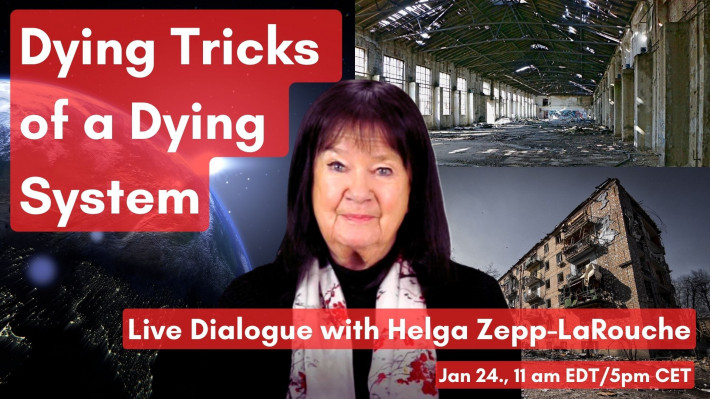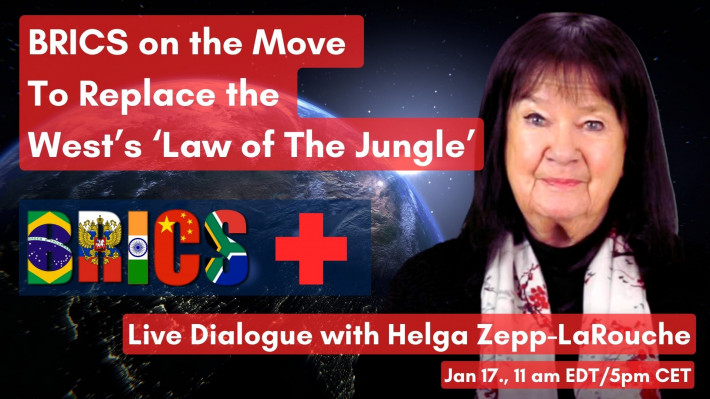Christmas Message from Helga Zepp-LaRouche, founder of the Schiller Institute December 21, 2023
No one will be able to claim, as historians said of World War I, that we sleepwalked into World War III. The war cries today are so deafening that they threaten to awaken from the dead all of the victims of previous wars, including the First and Second World Wars.
Tax money is poured into military spending of all kinds, while civilian economies collapse, infrastructure decays, and schools and hospitals are closed or fall apart. In the United States, the Pentagon’s defense budget for 2024 amounts to nearly one trillion dollars, while the entire EU budget and all national budgets in Europe are slated for militarization. German Defense Minister Boris Pistorius is demanding that society become “war-ready” and has asserted that we only have five to eight years before a major military confrontation with Russia. American think-tanks are working feverishly on “war games” for a major war with China, which should, in their view, take place sooner rather than later. See the article by the Council of Foreign Relations magazine, Foreign Affairs, “The Big One: Preparing for a Long War With China.”
How did we end up on this trajectory, which can only take us to a Third World War, a global nuclear war between the U.S. and NATO on the one side, and Russia and China on the other, and thus nuclear Armageddon?
President Eisenhower, at the end of his mandate, warned in 1961 against the explosion of the power of the military-industrial complex (MIC), saying:
“In the councils of government, we must guard against the acquisition of unwarranted influence, whether sought or unsought, by the military-industrial complex. The potential for the disastrous rise of misplaced power exists and will persist.”
Since then, history has unfortunately shown that Eisenhower’s advice was not followed, and that this “unwarranted influence” has spread throughout society and reduced governments to institutions doing the bidding of that MIC.
The decisive turning point occurred when the Soviet Union dissolved. Instead of establishing a new global order of peace, as Lyndon LaRouche had envisioned with his proposal for the Eurasian Land Bridge, which would have integrated the Eurasian continent economically and ensured close ties between East and West, the neocons opted for Anglo-American dominance over a unipolar world. The Wolfowitz Doctrine of 1992 stipulated that no country or group of countries would ever be allowed to surpass the U.S. in political, economic or military power.
Contrary to promises made to Soviet leader Mikhail Gorbachev at the time of German reunification, that NATO would not expand an “inch” eastward, NATO did just that. There were five NATO expansions extending 1,000 km eastward toward Russia’s borders, including the installation of potentially offensive missile defense systems in that area, which all preceded the Russian special operation of February 24, 2022 in Ukraine. A new Cuban Missile Crisis at a snail’s pace, so to speak.
The U.S. and NATO countries went for political control, for the idea that all countries in the world had to adopt the Western neoliberal model, i.e. regime change, color revolutions; interventionist wars in which many millions have died; military bases built around the world; war training for their foreign allies; imperial expansion of the EU and NATO up to the point of creating a global NATO as a means to contain real and potential rivals; sanctions aimed at affecting regime change; and finally weaponization of the dollar. All this under the banner of the “rules-based order,” liberal democracy, and human rights.
China, on the other hand, went for economic development and overcoming poverty for 850 million of its own citizens, initially, and then increasingly for win-win cooperation with the nations of the Global South through the New Silk Road Initiative. Thanks to this cooperation, those nations were given the chance for the first time to free themselves from the poverty and underdevelopment dating back to the colonial era. Today, 150 countries of the Global South are working together with China on thousands of New Silk Road projects, building roads and high-speed railroads, ports, airports, development corridors, industrial parks and more.
In the past ten years since China put the Belt and Road Initiative on the agenda, unbounded cultural optimism has spread among nations of the Global South, which has long since become the Global Majority, with the idea that they will soon become fully developed nations. They are responding to the weaponization of the dollar with de-dollarization, i.e., by trading in their own currencies and eventually planning their own reserve currency, by deepening the strategic partnership between Russia and China, creating their own organizations, such as the BRICS Plus, which will include ten members as of January 1, 2024, and dozens more very soon.
Conclusion: the attempt to respond to the disintegration of the Soviet Union with the utopia of a unipolar world order, held together by military power, has been a monumental failure. It has led to an unprecedented strategic blowback.
Therefore, the most crucial question is: Can we in the West, the U.S. and European nations, correct our political course in time, and choose cooperation with the Global South instead of confrontation? China and Russia have repeatedly emphasized that the Belt and Road Initiative and the BRICS countries are open to cooperation with the West!
The main difficulty lies in the fact that much of the economic capacities in the United States, and a growing share of those in Europe, have been taken over by the MIC, and are so closely entwined with the big investment firms and asset management companies of Wall Street and the City of London, that a better term is the military-industrial-financial complex (MIFC). (See this package of material on the MIFC.)
Technically speaking, it would be relatively easy to re-tool these capacities for civilian purposes, and rather than producing bombers, fighter jets, and missiles, to produce modern high-speed rail systems, inherently safe nuclear reactors of the 4th generation, and nuclear fusion reactors, as well as space stations for international space travel. In other words, all the industrial capacity currently used for the destruction of actual physical value—what else are weapons systems good for?—could serve the production of useful goods that promote the common good. Instead of tanks and ammunition, they could produce schools and hospitals, and help our nations to have prosperous economies once again!
Russian economist Sergei Glazyev put it in a nutshell in a message on the occasion of what would have been Lyndon LaRouche’s 100th birthday, which he unfortunately did not live to see. LaRouche not only forecast with farsightedness the crisis of the neoliberal system, but also proposed solutions to overcome this crisis. The countries that rejected his solutions are in crisis today, while those that implemented his ideas are prospering, Glazyev stated:
“In practically all the major countries in the world that today are developing successfully—above all India, and China—there are partisans of LaRouche. They have used his thoughts and ideas, for creating their economic miracles. It is the principles of Physical Economy championed by LaRouche, that today underlie the Chinese economic miracle and are there in the foundations of India’s economic development policy. The supporters of LaRouche in those countries exert a fruitful, very positive, and constructive influence on economic policy-shaping in these leading nations of the new world economic paradigm.”
It’s not yet too late. We need to replace the war cries for ever “more weapons” with a return to diplomacy and the idea that we can—and must—resolve all conflicts through negotiation, if we are to avoid ending up in global nuclear war and a nuclear winter, which would wipe out all memory of humanity’s existence.
Instead of the greed of the speculators of the MIFC, Wall Street, and the City of London, whose high rates of profit rely on taxpayer money pouring into new wars, we must defend the existential interest of the population: The interests of farmers, small and medium-sized businesses, train drivers, bakers, etc.
Swords to plowshares!
We are many, they are few!
For cooperation with the nations of the Global South!





























